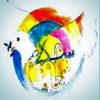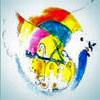Flowers spring up even in the desert, and one has blossomed in the hills of
Northern Galilee in Israel. In the space of a few miles there are kibbutzim,
moshavim and Arab Christian villages; Muslims, Circassians and Druse.
It is here that Angelica Edna Calò Livné works. An Italian Jew, born in Rome,
she immigrated to Israel 30 years ago. After obtaining her degree in social
theater and a masters program on integrating the arts into education, she had
the idea of using theater to promote peace. With this in mind, she founded the
Arcobaleno-Rainbow Theater Group. The troupe is made up entirely of young
people; half are Jewish and half are Arab.
Their latest success, Anne in the Sky, is based on the story of Anne Frank, a
subject close to Livné’s heart. There is also a mime-opera called Beresheet
(containing just five spoken sentences), which explores how conflicts originate.
Many Colors, One Rainbow
Livné firmly believes that her theater group can help promote peace, despite all
the differences and difficulties. “The idea of the Arcobaleno-Rainbow Theater
Group,” she explains, “is that the spectrum contains many colors, each different
from the other. And yet its beauty lies precisely in the fact that all these
different colors appear harmoniously together.”
Livné always wanted to use theater for education, and she has managed to put
together young people from completely different ethnic and cultural backgrounds.
“At one time,” she says, “I was teaching in five different schools, and I
decided to open a theater school. Lots of young people joined, but we didn’t
have any Arabs. On the kibbutz where I live, there was a young Palestinian lad
who worked in the kitchen. One day he saw me pinning up a poster for the school.
‘What are you doing?’ he asked. ‘I’m pinning up this poster. Why don’t you come
to my theater? Come on, don’t worry, anyone can act.’
“I convinced him to come,” she remembers. “Now half the students are Arabs and
half Jews. When you see them together, there are no obvious cultural or
religious differences. And yet they lead completely different lives, with
different languages, traditions and religions. There are even differences among
the Jews themselves,” Livné says.
“We meet once a week for three hours,” she explains. “But the first half hour is
always taken up with kisses and hugs and bringing each other up to date with
what has gone on over the last week.”
The basic idea behind the theater school is very simple: “Every religion, every
human being, every tradition has its own wonderful world. But because they don’t
know one another, there is fear of the unknown and mistrust, and this creates
conflict,” she says. “Somehow, through education, we have to bring young people
together and let them get to know each other, so that they can pass their
experience on to their people.”
Removing Masks
The first show is entitled Beresheet, (In the beginning), taken from the opening
words of the Bible. Livné explains: “To start with, all the actors are dressed
the same and are wearing masks. But after a while we discover that, underneath
the outer costume, some are wearing orange suits. Very soon those in the orange
suits are fighting those in the purple suits. Eventually, after suffering and
deaths, two characters detach themselves from the group. They start to get to
know one another, but the group turns their backs on them.”
At this point in the drama, Livné’s youngest son Or appears, dressed all in
white, as if to say, “Do it for the children.”
“Then they all remove their masks, something which is not normally done in
theater,” she says. “It is something we decided together. In fact the young
people said to me: ‘We want to take our masks off.’ And I said to them, ‘You
can’t, it’s a theatrical convention.’ They replied, ‘Perhaps if we break the
convention something will happen.’”
And, in fact, something happened. “Our show has a prophetic quality,” Livné
says. “There is a moment when the orange suits make a barrier. Then the purple
suits make a barrier behind them, like the wall we built in reply to the wall of
suicide bombers. Four years ago, when we first staged the show, the color orange
had no particular significance, but now it has become the color of the Gaza
disengagement plan.”
Public reaction to the show has been astounding. “At the end of the show, many
in the audience are left speechless. They just don’t know what to say,” explains
Livné. “At a certain point, the young people sit down on the stage and conduct a
dialogue with the audience. I act as interpreter. What they say is just what
they feel, and no one can make a judgment about it, because it is a show that
speaks for both sides."
Bread for Peace
Another point of encounter between Palestinians and Jews is the “Feast of
Bread.” The idea came about through the friendship between Samar, a Christian
from the Palestinian territories, and Edna. “Samar had opened a bakery in the
Palestinian zone and she was always saying to me: ‘One day I want to bake bread
with Israeli women.’ I lowered my head,” admits Edna, “But one day I said to
her: ‘I will bring you some Israeli women.’ In fact, I brought her fifty. Samar
had got everything ready, and there was even a Palestinian Scout band to welcome
us. I also decided to write an article about the event. I opened the Torah to
look for inspiration and eventually found a sentence in Leviticus: ‘And you will
eat and be satisfied. The sword will pass no more through your land, and you
will distribute the bread of peace.’ I copied it and sent it to Shalom (a Jewish
monthly published in Rome). It was February and this thing began to circulate on
the Internet. It gained official backing from the European Parliament and was
given the go ahead in Italy. And on June 1, 2005 the first Feast of Bread took
place in Italy, which was later repeated in Rome, Milan and Naples.”
Never short of new ideas, Edna has now started a radio program run by young
people for young people, entitled All for Peace, which is broadcast
simultaneously from Jerusalem and Ramallah. Who knows what she will come up with
next.
Learn more about the Arcobaleno-Rainbow Theater!





